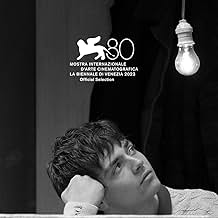Yurt
- 2023
- Tous publics
- 1h 56min
NOTE IMDb
6,8/10
1,1 k
MA NOTE
Ajouter une intrigue dans votre langueFourteen-year-old Ahmet leaves home for an all-boys religious dormitory, navigating family expectations, religious duties, and holding onto childhood amid environmental and personal changes.Fourteen-year-old Ahmet leaves home for an all-boys religious dormitory, navigating family expectations, religious duties, and holding onto childhood amid environmental and personal changes.Fourteen-year-old Ahmet leaves home for an all-boys religious dormitory, navigating family expectations, religious duties, and holding onto childhood amid environmental and personal changes.
- Réalisation
- Scénario
- Casting principal
- Récompenses
- 15 victoires et 26 nominations au total
Esila Ergun
- Little Girl
- (as Esila Ergün)
Avis à la une
10soulpark
When I first saw the trailer, I was genuinely excited and eagerly looking forward to watching it. There was something about the atmosphere and the visuals that instantly caught my attention and stayed with me. Last night, I finally had the chance to see it-and I absolutely loved it. It exceeded all my expectations and left a lasting impression. Both in terms of storytelling and cinematography, it was one of the most powerful, visually stunning, and emotionally captivating films I've seen in a long time. Every frame felt intentional, every moment meaningful. I can't recommend it enough-truly a must-watch.
I really loved this film-visually splendid and carried by outstanding performances. It subtly explores the grip of religious brotherhoods, operating in the shadow of Atatürk's legacy. With meticulous direction and a sensitive narrative, Yurt reveals an unfamiliar Turkey (for me) far from the cosmopolitan image of Istanbul that defines the country for most of people.,
The film is caught between tradition and secularism. We follow the inner turmoil of a young man navigating between these two opposing worlds, torn between the weight of his father's expectations and his desire to live freely, like any other teenager-but also those who don't have the privilege of existing between the two. Very touching and immersive, the film offers a poignant reflection on the search for freedom in a country undergoing profound transformation. A striking and singular work.
Some films entertain, some impress, and a rare few reach directly into your life and show you a truth you hadn't yet found the words for. Yurt(The Dormitory), Nehir Tuna's hauntingly intimate debut, is one of those rare films. It is a quiet masterpiece-so precise in its storytelling, so understated in its emotion, and yet, somehow, so overwhelmingly powerful.
I watched Yurt and, for the first time in my life, felt as if a film had reached me not just as a viewer, but as a human being living through a particular place, time, and atmosphere. Every frame of this film breathes, pauses, and listens. It does not shout or beg to be noticed-it simply exists, fully and truthfully, in a way that feels more like memory than narrative.
The story follows a young boy sent to a religious dormitory, navigating the silence between belief and doubt, masculinity and vulnerability, discipline and desire. The setting-both literal and psychological-evokes suffocation, but never melodrama. Tuna's brilliance lies in his restraint. Instead of imposing judgment, he invites us to sit beside the boy, to see what he sees, feel what he feels, and above all, to remember.
Visually, the film is exquisite. The use of light and shadow is not just beautiful, but meaningful-it conveys everything that cannot be said aloud in this repressive environment. The color palette reflects the emotional state of its characters-faded, cold, sometimes harsh, sometimes warm enough to hint at the possibility of tenderness. Tuna has an exceptional eye, one that understands not only how to look, but when to look, and when to turn away.
What struck me most was how effortlessly the film communicated the complexity of growing up in a space where power, control, and religious ideology intertwine. There's no simplistic good vs. Evil here. Tuna treats each character-even the sternest authority figures-with a kind of compassionate distance. The dormitory itself becomes a metaphor for a society that demands conformity and punishes softness, but it's never reduced to just that. It's more than a symbol; it's a world-one many of us will find painfully familiar.
As someone who teaches a course on "Political Inclusion and Art" , It captures the nuances of our political and social reality without didacticism, without slogans, and with a depth that only great art can offer. It tells the story of a generation growing up under quiet, everyday pressures-expectations about who they should be, how they should feel, what they should believe. But it tells that story with care, patience, and immense artistic control.
Nehir Tuna is a filmmaker whose lens understands the youth of this country better than any political analysis. His gaze is not just observant, it is human. He does not dramatize suffering-he simply shows it, in its slow, real, and often invisible forms.
Thank you, Nehir Tuna, for making something so precise, so compassionate, and so needed. You've given us a story that lingers-and a silence that speaks louder than anything else.
I watched Yurt and, for the first time in my life, felt as if a film had reached me not just as a viewer, but as a human being living through a particular place, time, and atmosphere. Every frame of this film breathes, pauses, and listens. It does not shout or beg to be noticed-it simply exists, fully and truthfully, in a way that feels more like memory than narrative.
The story follows a young boy sent to a religious dormitory, navigating the silence between belief and doubt, masculinity and vulnerability, discipline and desire. The setting-both literal and psychological-evokes suffocation, but never melodrama. Tuna's brilliance lies in his restraint. Instead of imposing judgment, he invites us to sit beside the boy, to see what he sees, feel what he feels, and above all, to remember.
Visually, the film is exquisite. The use of light and shadow is not just beautiful, but meaningful-it conveys everything that cannot be said aloud in this repressive environment. The color palette reflects the emotional state of its characters-faded, cold, sometimes harsh, sometimes warm enough to hint at the possibility of tenderness. Tuna has an exceptional eye, one that understands not only how to look, but when to look, and when to turn away.
What struck me most was how effortlessly the film communicated the complexity of growing up in a space where power, control, and religious ideology intertwine. There's no simplistic good vs. Evil here. Tuna treats each character-even the sternest authority figures-with a kind of compassionate distance. The dormitory itself becomes a metaphor for a society that demands conformity and punishes softness, but it's never reduced to just that. It's more than a symbol; it's a world-one many of us will find painfully familiar.
As someone who teaches a course on "Political Inclusion and Art" , It captures the nuances of our political and social reality without didacticism, without slogans, and with a depth that only great art can offer. It tells the story of a generation growing up under quiet, everyday pressures-expectations about who they should be, how they should feel, what they should believe. But it tells that story with care, patience, and immense artistic control.
Nehir Tuna is a filmmaker whose lens understands the youth of this country better than any political analysis. His gaze is not just observant, it is human. He does not dramatize suffering-he simply shows it, in its slow, real, and often invisible forms.
Thank you, Nehir Tuna, for making something so precise, so compassionate, and so needed. You've given us a story that lingers-and a silence that speaks louder than anything else.
I LOVE THIS!
An absolute feast of cinematic delights... From breathtaking cinematography to richly textured screenplay... This is a very very special film.
There's no point in telling the synopsis... The director, Nehir Tuna, uses the 'show, not tell' strategy to present this unique coming-of-age story... A wealthy teenage boy in 1996 Turkey parallelly attending a private school for rich kids and a religious school for poor kids where he also lives in a dormitory or Yurt... It is filled with countless fleeting moments of quiet observations and subtle commentaries on power, politics, love, rage, religion, obsession, friendship, class difference, income inequality, maturity and much more... which makes this film so Effective and Unforgettable.
Can't wait to watch more films from this director. Top-notch craftsmanship.
An absolute feast of cinematic delights... From breathtaking cinematography to richly textured screenplay... This is a very very special film.
There's no point in telling the synopsis... The director, Nehir Tuna, uses the 'show, not tell' strategy to present this unique coming-of-age story... A wealthy teenage boy in 1996 Turkey parallelly attending a private school for rich kids and a religious school for poor kids where he also lives in a dormitory or Yurt... It is filled with countless fleeting moments of quiet observations and subtle commentaries on power, politics, love, rage, religion, obsession, friendship, class difference, income inequality, maturity and much more... which makes this film so Effective and Unforgettable.
Can't wait to watch more films from this director. Top-notch craftsmanship.
Dormitory
The film radiates corners, longing and monochromatic volumes. It is a heart where the blooming childhood enters in the forest of demarcations. The picturesque of black and white creates an enigmatic frame of emotions. It fleshes the character into the nuances of humanity of the bygone era and question about it. Promising frames, detailed costumes, classic editing, layered actors. The child Ahmets vulnerability, innocence and understanding goes through the tones of revolution. The film showcases an individual revelation of Godhood, companionship, parental relationships and openings of love.
Le saviez-vous
- AnecdotesYURT is a Turkish-German-French co-production.
Meilleurs choix
Connectez-vous pour évaluer et suivre la liste de favoris afin de recevoir des recommandations personnalisées
- How long is Dormitory?Alimenté par Alexa
Détails
Box-office
- Montant brut mondial
- 86 322 $US
- Durée1 heure 56 minutes
- Couleur
Contribuer à cette page
Suggérer une modification ou ajouter du contenu manquant





















